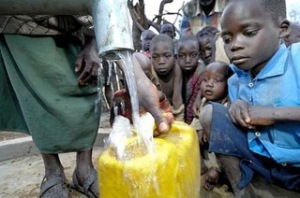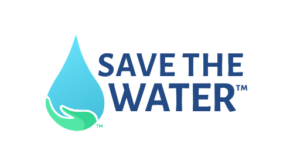
By Taylor Schaefer, staff writer for Save The Water™ | January 3, 2015
As citizens of the developing world, we often take for granted the everyday necessities that are so readily available to us. Having clean running water and a working toilet has a great impact on the way we live our lives and maintain our health. The average American uses 176 gallons of water per day compared to five gallons of water an average African family uses (3). Without access to clean water we would not be able to drink, bathe, properly clean our clothes, wash dishes or use the toilet. Can you imagine your daily routine without being able to accomplish any of these tasks? The reality is 2.5 billion people (one-third of the total population) lack access to clean water and sanitation (4). The leading cause of death for children under five is due to illnesses that can be prevented by improving water and sanitation conditions (4).
The Water for the World Act of 2014 is a recently-passed bipartisan legislation that uses existing investments for poverty programs and without spending new funds, redirects the money to people in areas of most need. This legislation focuses on the importance of using the funds effectively and transparently in order to provide millions of people with life saving programs (2).
This bill will not only have drastic effects on developing countries, but will also benefit the countries providing aid. It has been shown that increasing access to water, sanitation and hygiene creates a domino effect of improvement including educational opportunities, health and economic development. Investing in others not only yields impact for those in need, it is also fiscally responsible. Investments in water and sanitation are considered cost-effective; for every dollar spent on programs, there is a return of four dollars in economic productivity (2). This means that these investments would return about $220 billion to the global economy each year (2).
Congressman Earl Blumenauer (D-OR) recently stated, “It’s been almost a decade since we passed the Water for the Poor Act, which has helped millions of people around the world access clean water and sanitation. Since then, we have worked nonstop in a purely bipartisan fashion to expand and improve international water aid. Working with my friend, Ted Poe, and dedicated advocates, we have shown that politics stops at water and that Congress can come together to pass meaningful, substantive bills when put aside our differences for the good of the country and the world (1).”
As congress works diligently to implement water and sanitation programs around the world, there will be a shift in the way global challenges are addressed in the future. The Water for the World Act will also ignite a positive shift in global health, education and national security issues, leading to a more promising future for everyone.
To learn more about the Water for the World Act, visit http://www.wateraid.org/us/the-water-story/our-approach/policy-and-advocacy/the-water-for-the-world-act
Reference
- “Congressmen Blumenauer, Poe Water for the World Act Passes House of Representatives” December 8, 2014. eNews Park Forest. Press Release. https://www.epa.gov/haps/health-effects-notebook-hazardous-air-pollutants
- “Water Facts.” Water Information Program. 2014. https://www.globalwaters.org/resources/assets/senator-paul-simon-water-world-act-2014
- “Water for the World Act.” UNICEF. 2014. http://www.unicefusa.org/mission/survival/water/water-world-act

